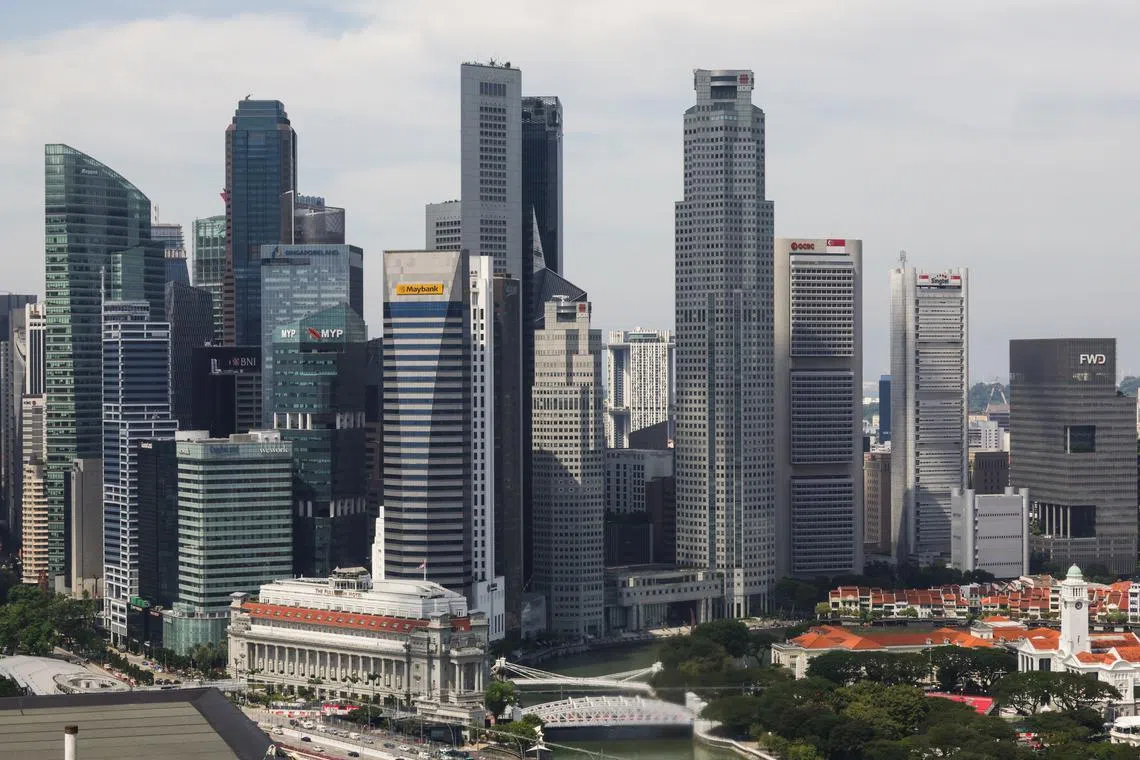ADB upgrades Singapore’s 2024 economic growth outlook on rising chip exports
Sign up now: Get ST's newsletters delivered to your inbox

The ADB expects all-items headline inflation in Singapore to ease to an average of 2.6 per cent.
ST PHOTO: GIN TAY
Follow topic:
SINGAPORE - Improving prospects of demand for electronic goods and financial services have lifted Singapore’s economic outlook for 2024, the Asian Development Bank (ADB) said on Sept 25.
The Manila-headquartered bank said Singapore will clock gross domestic product (GDP) growth of 2.6 per cent in 2024, up from 1.1 per cent in 2023, and better than its April forecast of 2.4 per cent. Meanwhile, inflation is set to decline this year and the next, it said.
The ADB upgrade comes a month after Singapore’s Ministry of Trade and Industry narrowed its estimate for 2024 GDP growth to a range of 2 per cent to 3 per cent, up from an earlier projection of 1 per cent to 3 per cent.
The Republic’s non-oil domestic exports rose 10.7 per cent year on year in August, mainly driven by a 35.1 per cent jump in electronic shipments.
“Exports will bolster growth in developing Asia’s high-income technology-exporting economies this year,” the ADB said in its latest Asian Development Outlook report.
The ADB said it expects the momentum in global electronics demand that has driven growth in Hong Kong, South Korea, Singapore and Taiwan in the first half of the year to continue.
On Sept 3, the global Semiconductor Industry Association said world chip sales reached US$51.3 billion (S$66.1 billion) during the month of July 2024, an increase of 18.7 per cent compared with sales in July 2023, and 2.7 per cent more than June 2024. Singapore in 2023 was the world’s third-largest chip supplier.
The ADB said the chip-driven rebound in exports will lift Singapore’s manufacturing sector, which had shrunk by 1.7 per cent in the first quarter and 1 per cent in the second. The bank provides loans and grants to developing nations across the Indo-Pacific region.
It said Singapore will remain on a steady path of growth through next year as well. It kept its GDP growth forecast of 2.6 per cent for 2025 for the Republic unchanged.
Meanwhile, the ADB expects that services – mainly finance, information and technology, retail, and tourism-related sectors – will continue to drive growth through the rest of 2024 after a strong performance in the first half, largely due to a concert-driven boost to retail and tourism.
However, the ADB said tourism and direct domestic consumer services will likely slow, weighing slightly on overall services growth.
Trade, in particular, should benefit from the global technology upturn, and modern services, particularly financial, should strengthen as interest rates gradually fall amid declining inflation at home and elsewhere.
The ADB expects that all-items headline inflation in Singapore will ease to an average of 2.6 per cent in 2024, lower than its April forecast of 3 per cent. In 2023, the all-items headline inflation in Singapore was 4.8 per cent.
Year-on-year headline inflation dropped to 2.2 per cent in August, from 2.4 per cent in July, and is at the lowest level since April 2021, according to data released on Sept 23 by Singapore’s Department of Statistics.
The ADB sees inflation easing further to average 2.2 per cent in 2025, aided by a strong trade-weighted Singapore dollar that should temper imported inflation in the months ahead.
It said inflation has retreated across Asia and continues to decline towards pre-pandemic levels, driven by the impact of past monetary tightening and easing global commodity prices – although food inflation is still slightly elevated.
Brent crude oil prices averaged US$83 a barrel from January to August 2024 and are expected to hover around this level through the end of the year, it said.
For 2025, oil prices are expected to decline to US$81 a barrel, with the International Energy Agency forecasting that oil supply will rise faster than demand with the unwinding of Opec-plus production cuts.
The ADB expects rice prices to decline from their current high levels.
Compared with the start of the year, rice prices have dropped 9.3 per cent, wheat 5.5 per cent, and maize 5.2 per cent as at early September, and may ease further as supply rises.
The UN’s Food and Agriculture Organisation expects rice production to reach a new record high in 2024/2025 as weather conditions are likely to improve.
Shipping costs have been on the rise again in recent months. Since January 2024, global shipping has been under pressure due to the conflict in the Red Sea, forcing ships to avoid the Suez Canal and the Bab El-Mandeb Strait and instead navigate around the Cape of Good Hope, increasing travel times and freight costs significantly.
The Drewry’s World Container Index, which tracks freight rates on eight major trade routes, rose from less than US$1,700 per 40-foot equivalent unit at the end of 2023 to above US$5,800 in July 2024.
While substantial, this increase is still smaller than the increase in shipping costs experienced during the pandemic, when they rose from US$1,600 in May 2020 to a high of US$10,100 in October 2021, and remained above US$9,000 until March 2022.
Hence, the ADB concluded that the spike in shipping costs is unlikely to renew price pressures globally or in Asia.
It also said that shipping costs account for a small share of household final consumption, not just in advanced economies like the United States but also in most trade-driven economies of Asia.
Shipping costs account for only 0.47 per cent of household income in Singapore, the ADB said.
Still, it warned that there are downside risks to Singapore’s economic growth outlook, including fragile external demand, further escalation in geopolitical tensions, potential disruptions in disinflationary momentum, and spillover effects from an economic slowdown in China.
Conversely, the outlook could beat expectations if inflation declines faster than forecast, a more robust export rebound materialises, and improving financial conditions provide additional support to investments, it noted.
ADB chief economist Albert Park said the risk of increased geopolitical tensions rests on the result of the US presidential election.
Republican Party candidate Donald Trump has promised a steep increase in tariffs on all US imports from China if he wins the polls in November.
Mr Park said in a virtual media briefing ahead of the release of the report: “Sharp shifts in US trade policies, foreign relations, or economic strategies post-election could impact global trade flows and investment patterns, adding another layer of complexity to the economic outlook.
“Rising protectionism could also lead to elevated volatility in global financial markets, and capital outflows from the region.”


